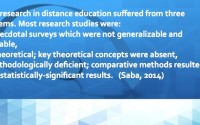
Exploring Motivation in an Online Context: A Case Study
With the increasing ubiquity of new technologies, many claims are being made about their potential to transform tertiary education. In order for this transformation to be realized, however, a range of issues needs to be addressed. Research evidence suggests that motivation is an important consideration for online learners. This paper reports on one aspect of […]
















